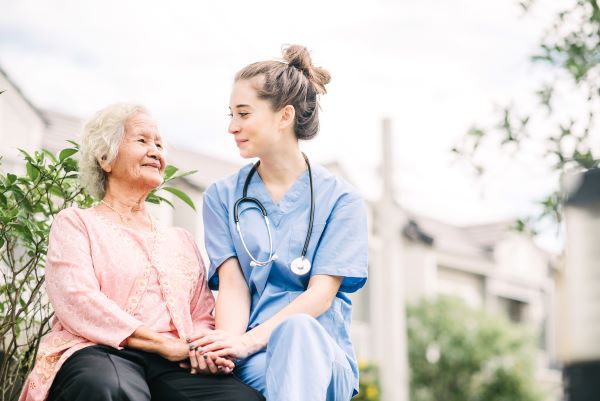The coronavirus pandemic has made advocating for your loved one in a nursing home more challenging than ever. Both residents and staff in nursing homes and other long-term care facilities are disproportionately affected by COVID-19 outbreaks. In fact, during the first year of the pandemic, the Kaiser Family Foundation (KFF) reports those in long-term care facilities accounted for thirty-one percent of all US COVID-19 deaths as of June 30, 2021.
The Omicron variant is the latest viral iteration, and it is highly transmissible though it appears to be less virulent than its predecessor, the Delta variant. It seems COVID-19 in its many strains will linger for some time to come, disproportionately affecting the vulnerable. If you have a loved one in a nursing home or other long-term care facility, AARP has identified some specific questions to ask about the facility to help ensure the safety of your loved one.
Inquire what the status of COVID-19 vaccinations are in the facility:
- What proportion of staff and residents are fully vaccinated? Compare these vaccination rates at any Medicare-certified nursing home to the state and national averages.
- How is the facility educating staff and residents regarding the vaccine’s safety and effectiveness?
- For those staff and residents who require them, are vaccines readily available?
Ask if anyone at the facility has tested COVID-19 positive in the past two weeks:
- Include staff, residents, visitors, vendors, maintenance workers, anyone who has access to the facility.
- If COVID-19 is present, how many people have tested positive?
- Who is the facility testing, and how often? Identifying positive cases requires routine testing at the facility.
What steps is the facility taking to prevent COVID-19 outbreaks?:
- What are the screening protocols for staff and other people who enter the facility?
- How are positive cases being handled after identification? Do staff quarantine at home? Do residents move into isolation units?
- What are the protocols for sanitizing the facility, and how often are they implemented?
- Are there social distancing measures in place? What are the precautions for residents with roommates?
Is there sufficient personal protective equipment (PPE) for staff, such as masks, face shields, gowns, gloves, and hand sanitizer?
- If the answer is no, is there a plan to get more? What are the safety measures in the meantime?
- Is the staff trained in the proper use of each PPE type?
How is the nursing home helping residents stay in contact with their families and other loved ones?
- Does the facility have in-person visitation? What are the infection control measures? If there isn’t in-person visitation, when will it resume? Is compassionate end-of-life visitation permitted?
- Does nursing home staff help residents call their loved ones via phone or video?
- Will the facility set up a regular schedule for residents to speak with family and loved ones?
How does the facility regularly communicate important information to residents and their loved ones?
- Can residents, family members, and staff determine the COVID-19 vaccination rates of other residents and staff facility-wide?
- If there is a COVID-19 case within the facility, how long will it take to notify residents and their families or representative?
- Is this information shared by phone, email, website, or another way?
Is the nursing home fully staffed with doctors, nurses, aides, and other workers?
- Is there a plan to ensure the needs of nursing home residents are met, including bathing, feeding, physical therapy if appropriate, medication management, and social engagement if there are staffing shortages?
How is the maintenance of healthy-living programs?
- Are communal activities adapted for social distancing in exercising, entertainment, and socialization?
- Are any services suspended, and if so, which ones?
If you have an older spouse, parent, sibling, or other loved one who is a resident in a nursing home, they depend on you to advocate for their protection and wellbeing. To nurture their best outcomes, it is incumbent on you to ask the right questions ensuring their residential facility is at its operational best to combat issues presented by COVID-19. If you have questions or would like to discuss your personal situation, please don’t hesitate to reach out. Contact our Albuquerque office at (505) 830-0202.

